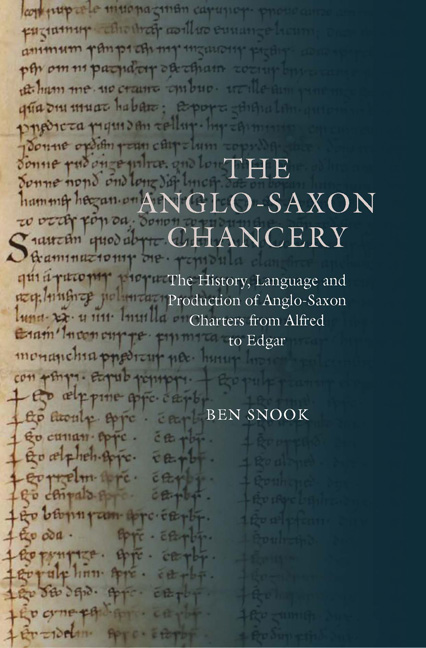 The Anglo-Saxon Chancery
The Anglo-Saxon Chancery Book contents
- Frontmatter
- Epigraph
- Contents
- Acknowledgements
- list of Abbreviations
- Timeline of Key Events between the Accession of Alfred and the Death of Edgar
- Introduction
- 1 Brave New World: The Charters of Alfred and Edward
- 2 Æthelstan
- 3 ‘Æthelstan A’
- 4 Turbulent Priests: Dunstan, Cenwald and Oda
- 5 Back to the Future: Edgar and ‘Edgar A’
- Conclusion
- Appendix I S 193
- Appendix II S 346
- Appendix III S 225
- Bibliography
- Index of charters
- Index
Introduction
Published online by Cambridge University Press: 05 May 2015
- Frontmatter
- Epigraph
- Contents
- Acknowledgements
- list of Abbreviations
- Timeline of Key Events between the Accession of Alfred and the Death of Edgar
- Introduction
- 1 Brave New World: The Charters of Alfred and Edward
- 2 Æthelstan
- 3 ‘Æthelstan A’
- 4 Turbulent Priests: Dunstan, Cenwald and Oda
- 5 Back to the Future: Edgar and ‘Edgar A’
- Conclusion
- Appendix I S 193
- Appendix II S 346
- Appendix III S 225
- Bibliography
- Index of charters
- Index
Summary
A brief history of the land charter in England
The ‘charters of the kings between edward the elder and edward the Martyr’, wrote Sir Frank Stenton in the middle of the 1950s, ‘form a monotonous series’. He continued: ‘as illustrations of curial scholarship these charters are disappointing.’ his words bode very badly indeed for a book which takes as its subject the charters of the kings between Edward ‘the Elder’ and Edward ‘the Martyr’. however, whilst Stenton got much right over the course of his long and distinguished career, when it came to tenth-century charters he may have been a little too quick to condemn; for the charters issued in the century between the accession of Alfred in 871 and the death of Edgar, his great-grandson, in 975, are some of the most challenging, obscure and fascinating documents of their type ever produced anywhere in early medieval europe.
The purpose of a medieval charter was, in essence, to record where and when who gave what to whom, and who was there when it happened. Most charters recorded gifts of land and then, subsequently, came to serve as the deeds to that land. They were, however, surprisingly flexible documents which could also record gifts of money, goods, privileges, trading rights and almost anything else. notwithstanding the necessary legal technicalities, medieval draftsmen tended to go about their business with the minimum of fuss. Straightforward and businesslike, the charters they wrote are historical bread-and-butter, the kind of document which allows historians to locate certain people in certain places at certain times before going on to deal with chronicles and histories, in the pages of which far more tantalising historical morsels are likely to be found than amongst the dry, narrative, pragmatic prose of the charter.
The diplomas of the Carolingians and then of the Capetians in France, and of the Ottonians in Germany, tended, with a few exceptions, to conform to this general stereotype.
- Type
- Chapter
- Information
- The Anglo-Saxon ChanceryThe History, Language and Production of Anglo-Saxon Charters from Alfred to Edgar, pp. 1 - 28Publisher: Boydell & BrewerPrint publication year: 2015


